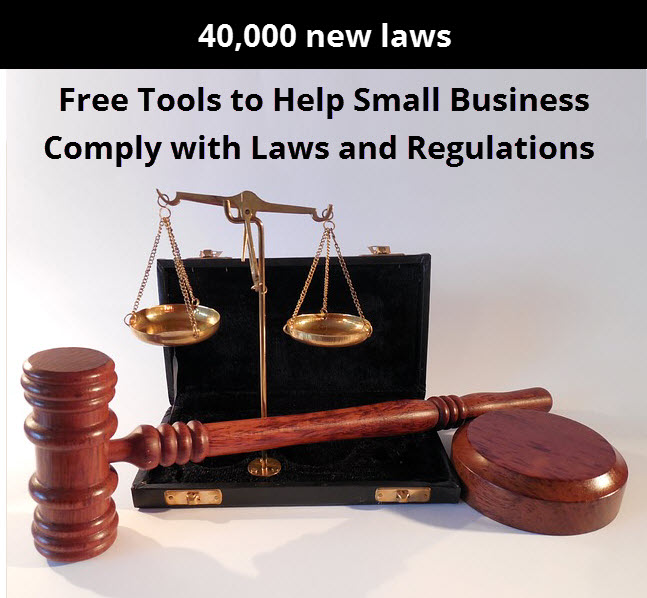
40,000 new laws went into effect this year. It is impossible for a small business to perfectly comply with laws and regulations. There are too many variable, the laws change without an email notification. If you are not well read and staying in tune to the requirements, it is easy to get behind the game.
One solution is to join associations, chambers, groups and special interest groups. You might subscribe to governement blogs and RSS feeds. Keeping up, understanding and making he changes necessary requires too many hours a month.
From starting and growing a business to managing operations day-to-day, one thing is certain in business – dealing with laws and regulations is not an option.
Whether you are hiring your first employee, formalizing your business structure, or applying for a license, you’ll encounter a hairball of ever-changing federal, state and local rules and regulations.
To help business owners unravel the hairball and get answers, SBA.gov offers a variety of helpful tools and resources.
1. Comply With Universal Business Laws
Whatever your business type, size or industry, there are many universal laws and regulations that will apply to you.
To help you navigate this landscape, SBA.gov’s Business Law Guide provides an overview of common business laws and regulations that currently impact small business. These include licenses and permit requirements, employment and labor laws, tax regulations, advertising law, finance, intellectual property, workplace health and safety, and data privacy laws.
In addition to this general guide, SBA also offers some useful step-by-step guides and tools that can help new business owners, in particular, take the right steps towards compliance:
- SBA Direct – This interactive and customizable tool gives you quick access to information you need by filtering content from across the SBA.gov website and matching you to business resources, advice and training in your region.
- 10 Steps to Starting a Business – This includes information on key legal steps that all new business owners need to be aware of as they start up.
- 5 Steps to Registering your Business – This provides information on incorporation, registering your business name and obtaining a tax ID.
- Hiring your First Employee – These 10 steps outline what you need to do to ensure you comply with key federal and state regulations when hiring.
- Business Licenses – All businesses need some form of license or permit to operate legally, even home-based businesses. To help you determine what your business needs, use SBA.gov’s “License and Permit Search Tool.” Simply enter your zip code and business type to see which licenses and permits apply to your small business along with links to web pages, application forms and instructions.
2. Comply With Specific Industry Laws
In addition to information about the laws and regulations that impact most small business owners, SBA.gov also includes a large selection of Industry Guides that provide resources, information and guidance for small businesses that operate in specific highly regulated industries.
As well as regulatory guidance, these guides also provide information on training, financing, and business growth strategies. For example, the Manufacturing Guide includes information on financing options, advice on "lean manufacturing," and an overview of free and low-cost in-person training programs to help small manufacturers expand and grow.
If you operate in a federally-regulated industry including agriculture, alcohol, tobacco, aviation, wildlife or fishing, among others, you’ll also need to register for a specific federal license or permit.
Which is your favorite resource for avoiding future calamities?